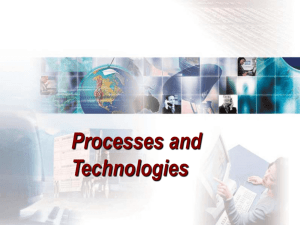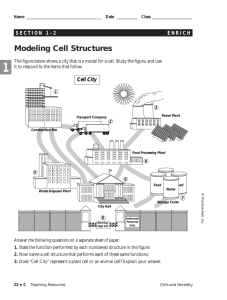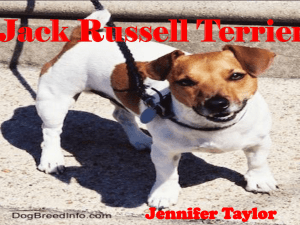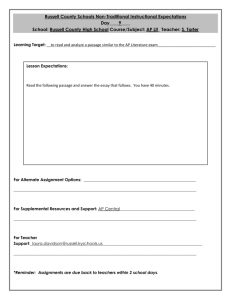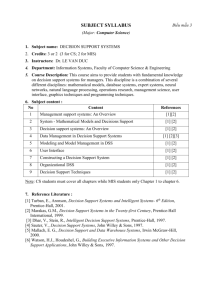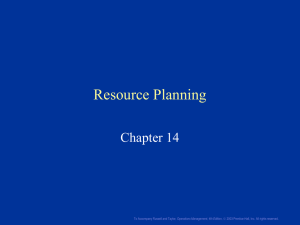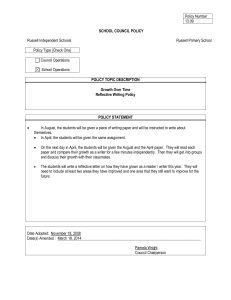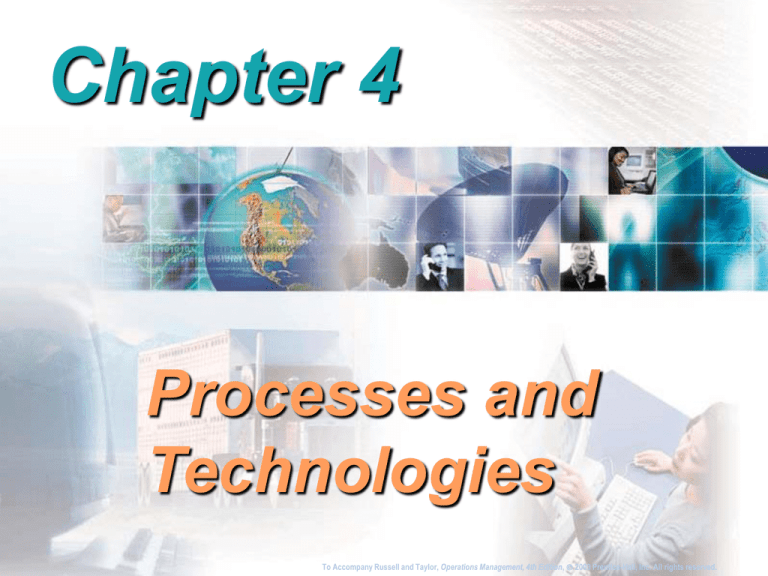
Chapter 4
Processes and
Technologies
To Accompany Russell and Taylor, Operations Management, 4th Edition, 2003 Prentice-Hall, Inc. All rights reserved.
To Accompany Russell and Taylor, Operations Management, 4th Edition, 2003 Prentice-Hall, Inc. All rights reserved.
Process Strategy
Overall approach to producing
goods and services
Defines:
Capital intensity
Process flexibility
Vertical integration
Customer involvement
To Accompany Russell and Taylor, Operations Management, 4th Edition, 2003 Prentice-Hall, Inc. All rights reserved.
From Function to Process
Sales
Manufacturing
Purchasing
Accounting
Product Development
Order Fulfillment
Supply Chain Management
Customer Service
Function
Process
Figure 4.1
To Accompany Russell and Taylor, Operations Management, 4th Edition, 2003 Prentice-Hall, Inc. All rights reserved.
Types of Processes
Projects
Batch
production
Mass
production
Continuous
production
To Accompany Russell and Taylor, Operations Management, 4th Edition, 2003 Prentice-Hall, Inc. All rights reserved.
Types of Processes
Product
Customer
Demand
Volume
No. of different
products
System
Equipment
Type of work
Skills
Advantages
Disadvantages
Example
Table 4.1
PROJECT
BATCH
MASS
CONTINUOUS
Unique
One-at-a-time
Infrequent
Very low
Infinite
Made to order
Few individuals
Fluctuates
Low to med
Many, varied
Made to stock
Mass market
Stable
High
Few
Commodity
Mass market
Very stable
Very high
Very low
Long-term
Discrete, job
Repetitive,
assembly lines
Varied
General-purpose Special-purpose
Contracts
Fabrication
Assembly
Experts,
Wide range
Limited range
craftspeople
of skills
of skills
Custom work, Flexibility,
Efficiency,
technology
quality
speed, low cost
Nonrepetitive, Costly, slow,
Capital investment,
small customer difficult to
lack of
base, expensive manage
responsiveness
Construction,
Machine shops, Autos, TV’s,
shipbuilding
printing, bakery fast food
Process industry
Highly automated
Mix, treat, refine
Equipment
monitors
Highly efficient
large capacity
Difficult to
change
Paint, chemicals,
food
To Accompany Russell and Taylor, Operations Management, 4th Edition, 2003 Prentice-Hall, Inc. All rights reserved.
Process Selection with
Break-Even Analysis
Total cost = fixed cost + total variable cost
TC = cf + vcv
Total revenue = volume x price
TR = vp
Profit = total revenue - total cost
Z = TR - TC
= vp - (cf + vcv)
To Accompany Russell and Taylor, Operations Management, 4th Edition, 2003 Prentice-Hall, Inc. All rights reserved.
Process Selection with
Break-Even Analysis
Total cost = fixed cost + total variable cost
TC = cf + vcv
Total revenue = volume x price
TR = vp
Profit = total revenue - total cost
Z = TR - TC
= vp - (cf + vcv)
cf
v
cv
p
= fixed cost
= volume (i.e., number of units produced and sold)
= variable cost per unit
= price per unit
To Accompany Russell and Taylor, Operations Management, 4th Edition, 2003 Prentice-Hall, Inc. All rights reserved.
Solving for
Break-Even Volume
TR = TC
vp = cf + vcv
vp - vcv = cf
v(p - cv) = cf
cf
v= p-c
v
To Accompany Russell and Taylor, Operations Management, 4th Edition, 2003 Prentice-Hall, Inc. All rights reserved.
Break-Even Analysis
Fixed cost = cf = $2,000
Variable cost = cv = $5 per raft
Price = p = $10 per raft
Example 4.1
To Accompany Russell and Taylor, Operations Management, 4th Edition, 2003 Prentice-Hall, Inc. All rights reserved.
Break-Even Analysis
Fixed cost = cf = $2,000
Variable cost = cv = $5 per raft
Price = p = $10 per raft
The break-even point is
cf
2000
v= p-c =
= 400 rafts
v
10 - 5
Example 4.1
To Accompany Russell and Taylor, Operations Management, 4th Edition, 2003 Prentice-Hall, Inc. All rights reserved.
Break-Even Analysis
Fixed cost = cf = $2,000
Variable cost = cv = $5 per raft
$3,000 —
Price = p = $10 per raft
$2,000 —
The break-even point is
cf
2000
v= p-c =
= 400 rafts
v
10 - 5
$1,000 —
Units
Example 4.1
To Accompany Russell and Taylor, Operations Management, 4th Edition, 2003 Prentice-Hall, Inc. All rights reserved.
Break-Even Analysis
Fixed cost = cf = $2,000
Variable cost = cv = $5 per raft
$3,000 —
Price = p = $10 per raft
$2,000 —
The break-even point is
cf
2000
Total
v = p - revenue
cv = 10 - 5 = 400 rafts
line
$1,000 —
Units
Example 4.1
To Accompany Russell and Taylor, Operations Management, 4th Edition, 2003 Prentice-Hall, Inc. All rights reserved.
Break-Even Analysis
Fixed cost = cf = $2,000
Variable cost = cv = $5 per raft
$3,000 —
Price = p =Total
$10 per raft
cost
line
$2,000 —
The break-even point is
cf
2000
Total
v = p - revenue
cv = 10 - 5 = 400 rafts
line
$1,000 —
Units
Example 4.1
To Accompany Russell and Taylor, Operations Management, 4th Edition, 2003 Prentice-Hall, Inc. All rights reserved.
Break-Even Analysis
Fixed cost = cf = $2,000
Variable cost = cv = $5 per raft
$3,000 —
Price = p =Total
$10 per raft
cost
line
$2,000 —
The break-even point is
cf
2000
Total
v = p - revenue
cv = 10 - 5 = 400 rafts
line
$1,000 —
400
Break-even point
Units
Example 4.1
To Accompany Russell and Taylor, Operations Management, 4th Edition, 2003 Prentice-Hall, Inc. All rights reserved.
Choosing Between
Two Processes
Process A
Process B
$2,000 + $5v = $10,000 + $2v
$3v = $8,000
v = 2,667 rafts
Example 4.2
To Accompany Russell and Taylor, Operations Management, 4th Edition, 2003 Prentice-Hall, Inc. All rights reserved.
Choosing Between
Two Processes
Process A
Process B
$2,000 + $5v = $10,000 + $2v
$3v = $8,000
v = 2,667 rafts
Below 2,667, choose A
Above 2,667, choose B
Example 4.2
To Accompany Russell and Taylor, Operations Management, 4th Edition, 2003 Prentice-Hall, Inc. All rights reserved.
Choosing Between
Two Processes
$20,000 —
$15,000 —
$10,000 —
$5,000 —
|
1000
|
2000
|
3000
|
4000 Units
Example 4.2
To Accompany Russell and Taylor, Operations Management, 4th Edition, 2003 Prentice-Hall, Inc. All rights reserved.
Choosing Between
Two Processes
$20,000 —
Total cost of
process A
$15,000 —
$10,000 —
$5,000 —
|
1000
|
2000
|
3000
|
4000 Units
Example 4.2
To Accompany Russell and Taylor, Operations Management, 4th Edition, 2003 Prentice-Hall, Inc. All rights reserved.
Choosing Between
Two Processes
$20,000 —
Total cost of
process A
Total cost of
process B
$15,000 —
$10,000 —
$5,000 —
|
1000
|
2000
|
3000
|
4000 Units
Example 4.2
To Accompany Russell and Taylor, Operations Management, 4th Edition, 2003 Prentice-Hall, Inc. All rights reserved.
Choosing Between
Two Processes
$20,000 —
Total cost of
process A
Total cost of
process B
$15,000 —
$10,000 —
$5,000 —
Choose
process A
|
1000
|
2000
|
3000
|
4000 Units
Example 4.2
To Accompany Russell and Taylor, Operations Management, 4th Edition, 2003 Prentice-Hall, Inc. All rights reserved.
Choosing Between
Two Processes
$20,000 —
Total cost of
process A
Total cost of
process B
$15,000 —
$10,000 —
$5,000 —
Choose
process A
|
1000
|
2000
Choose
process B
|
3000
|
4000 Units
Example 4.2
To Accompany Russell and Taylor, Operations Management, 4th Edition, 2003 Prentice-Hall, Inc. All rights reserved.
Choosing Between
Two Processes
$20,000 —
Total cost of
process A
Total cost of
process B
$15,000 —
$10,000 —
$5,000 —
Choose
process A
|
1000
|
2000
Choose
process B
|
3000
|
4000 Units
Point of indifference = 2,667 Units
Example 4.2
To Accompany Russell and Taylor, Operations Management, 4th Edition, 2003 Prentice-Hall, Inc. All rights reserved.
Point of Indifference
Volume where cost of A = cost of B
Rule for choosing process:
Above point of indifference
choose process with
lowest variable cost
Below point of indifference
choose process with
lowest fixed cost
To Accompany Russell and Taylor, Operations Management, 4th Edition, 2003 Prentice-Hall, Inc. All rights reserved.
Process Planning
Make-or-buy decisions
Process selection
Specific equipment selection
Process plans
Process analysis
To Accompany Russell and Taylor, Operations Management, 4th Edition, 2003 Prentice-Hall, Inc. All rights reserved.
Make-or-Buy Decisions
1.
2.
3.
4.
5.
6.
Cost
Capacity
Quality
Speed
Reliability
Expertise
Make?
Buy?
To Accompany Russell and Taylor, Operations Management, 4th Edition, 2003 Prentice-Hall, Inc. All rights reserved.
Specific Equipment
Selection
1. Purchase cost
2. Operating cost
3. Annual savings
4. Revenue
enhancement
5. Replacement analysis
6. Risk and uncertainty
7. Piecemeal analysis
To Accompany Russell and Taylor, Operations Management, 4th Edition, 2003 Prentice-Hall, Inc. All rights reserved.
Process Plans
Blueprints
Bill of material
Assembly chart /
product structure
diagram
Operations process
chart
Routing sheet
To Accompany Russell and Taylor, Operations Management, 4th Edition, 2003 Prentice-Hall, Inc. All rights reserved.
Bottom bun
Process Plans
Beef patty
Salt
Cheese
SA
Lettuce
Sauce
Onions
First-layer assembly
Middle bun
Beef patty
Salt
Cheese
Lettuce
Sauce
Onions
Pickles
SA
Second-layer assembly
Sesame seed top bun
Wrapper
Completed Big Mac
Figure 4.2
To Accompany Russell and Taylor, Operations Management, 4th Edition, 2003 Prentice-Hall, Inc. All rights reserved.
Operations Process Chart
Part name
Crevice Tool
Part No.
52074
Usage
Hand-Vac
Assembly No. 520
Oper. No. Description
Dept.
Machine/Tools
Time
10
Pour in plastic bits
041
Injection molding
2 min
20
Insert mold
041
#076
2 min
30
Check settings
& start machine
041
113, 67, 650
20 min
40
Collect parts & lay flat
051
Plastics finishing
10 min
50
Remove & clean mold
042
Parts washer
15 min
60
Break off rough edges
051
Plastics finishing
10 min
Figure 4.3
To Accompany Russell and Taylor, Operations Management, 4th Edition, 2003 Prentice-Hall, Inc. All rights reserved.
Process Analysis
The systematic examination of all aspects
of a process to improve its operation
Faster
More efficient
Less costly
More responsive
Basic tools
Process flowchart
Process diagrams
Process maps
To Accompany Russell and Taylor, Operations Management, 4th Edition, 2003 Prentice-Hall, Inc. All rights reserved.
Process Flowchart Symbols
Operations
Inspection
Transportation
Delay
Storage
To Accompany Russell and Taylor, Operations Management, 4th Edition, 2003 Prentice-Hall, Inc. All rights reserved.
Process Flowchart
Description
of
process
1
Unload apples from truck
2
Move to inspection station
3
Weigh, inspect, sort
4
Move to storage
5
Wait until needed
6
Move to peeler
7
Apples peeled and cored
15
8
Soak in water until needed
20
9
Place in conveyor
5
10
Move to mixing area
11
Weigh, inspect, sort
Page 1 0f 3
Total
Distance
(feet)
Location: Graves Mountain
Process: Apple Sauce
Time
(min)
Operation
Transport
Inspect
Delay
Storage
Step
Date: 9-30-02
Analyst: TLR
20
100 ft
30
50 ft
360
20 ft
20 ft
30
480
190 ft
Figure 4.4
To Accompany Russell and Taylor, Operations Management, 4th Edition, 2003 Prentice-Hall, Inc. All rights reserved.
Process Diagram
UPS
Active
Bins
Receiving
Reserve
Storage
Picking
Packing
Monogramming
Shipping
Parcel
Post
Next-Day
UPS
Embroidering
Quality
Assurance
Back to
Vendor
Hemming
Gift
Boxing
Figure 4.5
To Accompany Russell and Taylor, Operations Management, 4th Edition, 2003 Prentice-Hall, Inc. All rights reserved.
Process Map
Customer
Waiter
Place order
Is order
complete?
Salad Chef
Dinner Chef
N
Y
Give soup or salad order to chef
Prepare soup or
salad order
Prepare dinner
order
Give dinner order to chef
Drink
Get drinks for customer
Eat salad or
soup
Deliver salad or soup order to customer
Eat dinner
Deliver dinner to customer
Receives check
Deliver check to customer
Gives payment
to waiter
Receive payment for meal
Give order
to waiter
Give order
to waiter
Credit
Cash or
Credit?
Cash
Collect change,
leave tip
Bring change to customer
Run credit card through
Fill in tip
amount
Return credit slip to customer
Figure 4.6
Collect tip
To Accompany Russell and Taylor, Operations Management, 4th Edition, 2003 Prentice-Hall, Inc. All rights reserved.
Extend’s Fast Food Simulation Model
Figure 4.7
To Accompany Russell and Taylor, Operations Management, 4th Edition, 2003 Prentice-Hall, Inc. All rights reserved.
SAP Solution for Apparel
Figure 4.8
To Accompany Russell and Taylor, Operations Management, 4th Edition, 2003 Prentice-Hall, Inc. All rights reserved.
Continuous Improvement
and Breakthroughs
Continuous improvement
refines the breakthrough
Breakthrough
Improvement
Continuous improvement activities
peak; time to reengineer process
Figure 4.9
To Accompany Russell and Taylor, Operations Management, 4th Edition, 2003 Prentice-Hall, Inc. All rights reserved.
Process Reengineering
Customer
requirements
data
Strategic
directive
Benchmark
data
Goals & specifications
for process performance
Design
principle
s
Baseline
analysis
High-level
process map
Key
performance
measures
Detailed
process map
Innovative
ideas
Model
validation
Pilot study of
new design
Full-scale implementation
Figure 4.10
To Accompany Russell and Taylor, Operations Management, 4th Edition, 2003 Prentice-Hall, Inc. All rights reserved.
High-Level Process Map
Subprocess
Subprocess
Input
Output
Subprocess
Performance
Goal
Subprocess
Figure 4.11
To Accompany Russell and Taylor, Operations Management, 4th Edition, 2003 Prentice-Hall, Inc. All rights reserved.
Principles for
Redesigning Processes
1. Remove waste, simplify,
consolidate
2. Link processes to create value
3. Let the swiftest and most capable
execute
4. Flex the process
5. Capture information digitally and
propagate
Table 4.2
To Accompany Russell and Taylor, Operations Management, 4th Edition, 2003 Prentice-Hall, Inc. All rights reserved.
Principles for
Redesigning Processes
6. Provide visibility through
information about process status
7. Fit the process with sensors and
feedback loops
8. Add analytic capabilities
9. Connect, collect and create
knowledge around the process
10. Personalize the process
Table 4.2
To Accompany Russell and Taylor, Operations Management, 4th Edition, 2003 Prentice-Hall, Inc. All rights reserved.
Techniques for Generating
Innovative Ideas
Vary entry point to a problem
Draw analogies
Change your perspective
Try inverse brainstorming
Chain forward as far as possible
Use attribute brainstorming
Table 4.3
To Accompany Russell and Taylor, Operations Management, 4th Edition, 2003 Prentice-Hall, Inc. All rights reserved.
Information Technology
Management Information Systems
(MIS)
Move large amounts of data
Decision Support Systems (DSS)
Add decision making support
Expert System
Recommend decision based on
expert knowledge
To Accompany Russell and Taylor, Operations Management, 4th Edition, 2003 Prentice-Hall, Inc. All rights reserved.
Decision Support System
Management
Personnel
Accounting
Data
Computer
system:
data
processing
Information:
reports,
model
results
Production
Marketing
Distribution
Other areas
To Accompany Russell and Taylor, Operations Management, 4th Edition, 2003 Prentice-Hall, Inc. All rights reserved.
Decision Support System
Management
Management Information
System
Personnel
Accounting
Data
Computer
system:
data
processing
Information:
reports,
model
results
Production
Marketing
Distribution
Other areas
To Accompany Russell and Taylor, Operations Management, 4th Edition, 2003 Prentice-Hall, Inc. All rights reserved.
Decision Support System
Decision Support System
Management
Management Information
System
Personnel
Accounting
Data
Computer
system:
data
processing
Information:
reports,
model
results
Production
Decisions
Marketing
Distribution
Other areas
Figure 4.12
Quantitative
techniques
What-if? analysis
To Accompany Russell and Taylor, Operations Management, 4th Edition, 2003 Prentice-Hall, Inc. All rights reserved.
Artificial Intelligence
Neural networks
Emulate interconnections in
brain
Genetic algorithms
Based on adaptive capabilities in
nature
Fuzzy logic
Simulate human ability to deal
with ambiguity
To Accompany Russell and Taylor, Operations Management, 4th Edition, 2003 Prentice-Hall, Inc. All rights reserved.
Enterprise Software
Collect, analyze, and make decisions
based on data
ERP - Enterprise Resource Planning
Managing wide range of processes
Human resources, materials management,
supply chains, accounting, finance,
manufacturing, sales force automation,
customer service, customer order entry
Finding hidden patterns through data
mining
To Accompany Russell and Taylor, Operations Management, 4th Edition, 2003 Prentice-Hall, Inc. All rights reserved.
Advanced Communications
Electronic data interchange (EDI)
Internet, extranets
Wireless communications
Teleconferencing &
telecommuting
Bar coding, RFT
Virtual reality
To Accompany Russell and Taylor, Operations Management, 4th Edition, 2003 Prentice-Hall, Inc. All rights reserved.
Manufacturing Technology
Numerically controlled (NC) machines
Controlled by punched tape
Computer numerical controlled (CNC)
Controlled by attached computer
Direct numerical control (DNC)
Several NC machines controlled by single
computer
Flexible manufacturing systems (FMS)
Includes automated material handling
To Accompany Russell and Taylor, Operations Management, 4th Edition, 2003 Prentice-Hall, Inc. All rights reserved.
Automated Material
Handling
Conveyors
Automated guided
vehicle (AGV)
Automated storage
& retrieval system
(ASRS)
To Accompany Russell and Taylor, Operations Management, 4th Edition, 2003 Prentice-Hall, Inc. All rights reserved.
Flexible Manufacturing
Systems (FMS)
Programmable machine tools
Controlled by common computer
network
Combines flexibility with efficiency
Reduces setup & queue times
To Accompany Russell and Taylor, Operations Management, 4th Edition, 2003 Prentice-Hall, Inc. All rights reserved.
Flexible Manufacturing
System
CNC
Machine
Finished
goods
Computer
control
room
Terminal
Pallet
Automatic
tool changer
CNC
Machine
Parts
Figure 4.13
To Accompany Russell and Taylor, Operations Management, 4th Edition, 2003 Prentice-Hall, Inc. All rights reserved.
Robotics
Programmable manipulators
Follow specified path
Better than humans with
respect to
Hostile environments
Long hours
Consistency
Adoption has been slowed by
ineffective integration and
adaptation of systems
To Accompany Russell and Taylor, Operations Management, 4th Edition, 2003 Prentice-Hall, Inc. All rights reserved.
e-Manufacturing
Real-time sharing of data with trading
partners and customers to drive
collaborative decisions
CAD - uses software to create & modify
designs
GT- classifies designs to benefit from prior
experience
STEP - sets standards for communication
CAPP - creates processing instructions for
CAM
CAM - uses programmable automation in
manufacturing
To Accompany Russell and Taylor, Operations Management, 4th Edition, 2003 Prentice-Hall, Inc. All rights reserved.
Components of e-Manufacturing
CAD
GT
CAE
CPC
PDM
Product
life cycle
Product
Definition
B2B, B2C
Products
Bar codes,
RFT, EDI
STEP
ERP
CAD/CAM
Information
Technology
eM
Processes
SCM, CRM
CAPP
DSS/ES/AI
Sourcing &
e-procurement
Manufacture
Internet, Intranet,
extranet,
satellites
CNC
machines
FMS
Robotics
AGV,
ASRS
Process
control
Cells
Multiple factory
and centers sites & suppliers
Figure 4.14
To Accompany Russell and Taylor, Operations Management, 4th Edition, 2003 Prentice-Hall, Inc. All rights reserved.

